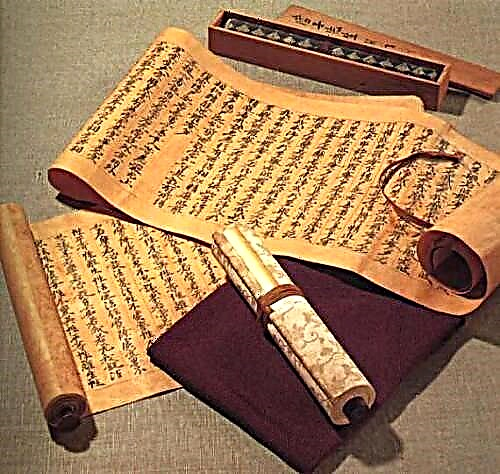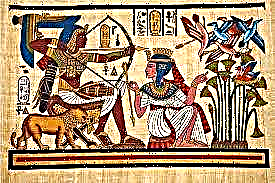Publius Virgil Maron (70-19 years. As the author of 3 great poems, he eclipsed the Greeks Theocritus ("Bucolics"), Hesiod ("Georgics") and Homer ("Aeneid").

There are many interesting facts in the biography of Virgil, which we will talk about in this article.
So, before you is a short biography of Publius Virgil.
Biography of Virgil
Virgil was born on October 15, 70 BC. in Cisalpine Galia (Roman Republic). He grew up in a simple but wealthy family of Virgil Sr. and his wife, Magic Polla.
In addition to him, his parents had three more children, of which only one managed to survive - Valery Prokul.
Childhood and youth
Almost nothing is known about the poet's childhood. When he was 12 years old, he studied at a grammar school. After that, he studied in Milan, Rome and Naples. Biographers suggest that it was the father who encouraged Virgil to political activity, wanting his son to be in the circle of aristocrats.
In educational institutions, Virgil studied rhetoric, writing and philosophy. An interesting fact is that, according to his views, the closest philosophical direction to him was epicureanism.
Despite the fact that Publius was making progress in his studies, he did not at all own the oratory, which any politician needed. Only once did the guy speak at the trial, where he suffered a crushing fiasco. His speech was too slow, hesitant, and confused.
Virgil also studied Greek language and literature. City life tired him, as a result of which he always wanted to return to his native province and live in harmony with nature.
As a result, over time Publius Virgil nevertheless returned to his small homeland, where he began to write his first poems - "Bucolics" ("Eclogi"). However, the quiet and peaceful life was interrupted by state reforms.
Literature and philosophy
After the battle in the Philippines, Caesar promised to allocate land to all veterans. For this reason, part of their estates was confiscated from many citizens. Publius became one of those who were expelled from their possessions.
By the time of his biography, Virgil already had a certain popularity, thanks to his own works - "Polemon", "Daphnis" and "Alexis". When the poet was left without a roof over his head, his friends turned to Octavian Augustus for help.
It is worth noting that Augustus personally familiarized himself with and approved the works of the young poet, ordering to provide him with a house in Rome, as well as an estate in Campania. As a token of gratitude, Virgil glorified Octavian in the new eclogue "Tythir".

After the Perusian War, a new wave of property confiscation took place in the state. And again Augustus interceded for Publius. The poet wrote the seventh eclogue in honor of the newborn son of the patron, calling him "a citizen of the golden age."
When relative peace was restored in the Roman Republic, Virgil was fully able to devote his free time to creativity. He often traveled to Naples because of the mild climate. At this time, he published the famous "Georgics" biographies, urging his compatriots to restore the economy destroyed after the wars.
Publius Virgil had at his disposal many serious works, thanks to which he was able to study not only the poems of different authors, but also the history of ancient cities and settlements. Later, these works will inspire him to create the world famous "Aeneid".
It is important to note that Virgil, along with Ovid and Horace, is considered the greatest poet of antiquity. The first major work of Publius was the Bucolics (39 BC), which was a cycle of shepherd's verses. These versification gained immense popularity, making their author the most famous poet of his time.
An interesting fact is that it was this work that led to the formation of a new bucolic genre. As for the purity and completeness of the verse, in this case, the peak of Virgil's work is considered to be the Georgiki (29 BC) - a didactic epic about agriculture.
This poem consisted of 2,188 verses and 4 books, which touched upon the themes of agriculture, fruit growing, cattle breeding, beekeeping, the denial of atheism and other areas.

After that Virgil set about creating the Aeneid, a poem about the origins of Roman history, conceived as a "response to Homer." He did not manage to finish this work and even wanted to burn his masterpiece on the eve of his death. And yet, the Aeneid was published and became a real national epic for the Roman Republic.
Many phrases from this work quickly diverged into quotations, including:
- "Judge others one by one."
- "Cursed thirst for gold."
- "By delay he saved the case."
- "I am afraid of the Danes, and those who bring gifts."
In the Middle Ages and the Early Modern Era, the Aeneid was one of the few ancient works that did not lose its relevance. Interestingly, it was Virgil that Dante portrayed in The Divine Comedy as his guide through the afterlife. This poem is still included in the school curriculum in many countries around the world.
Death
In 29 A.D. Virgil decided to go to Greece to rest and work on the Aeneid, but Augustus, who met the poet in Athens, convinced him to return to his homeland as soon as possible. Traveling badly affected the health of the man.
Upon arrival home, Publius fell seriously ill. He developed a severe fever, which became the cause of his death. When, shortly before his death, he tried to burn the Aeneid, his friends, Varius and Tukka, persuaded him to keep the manuscript and promised to put it in order.
The poet ordered not to add anything from himself, but only to delete the unfortunate places. This explains the fact that the poem contains many incomplete and fragmentary poems. Publius Virgil died on September 21, 19 BC. at the age of 50.
Virgil Photos
















